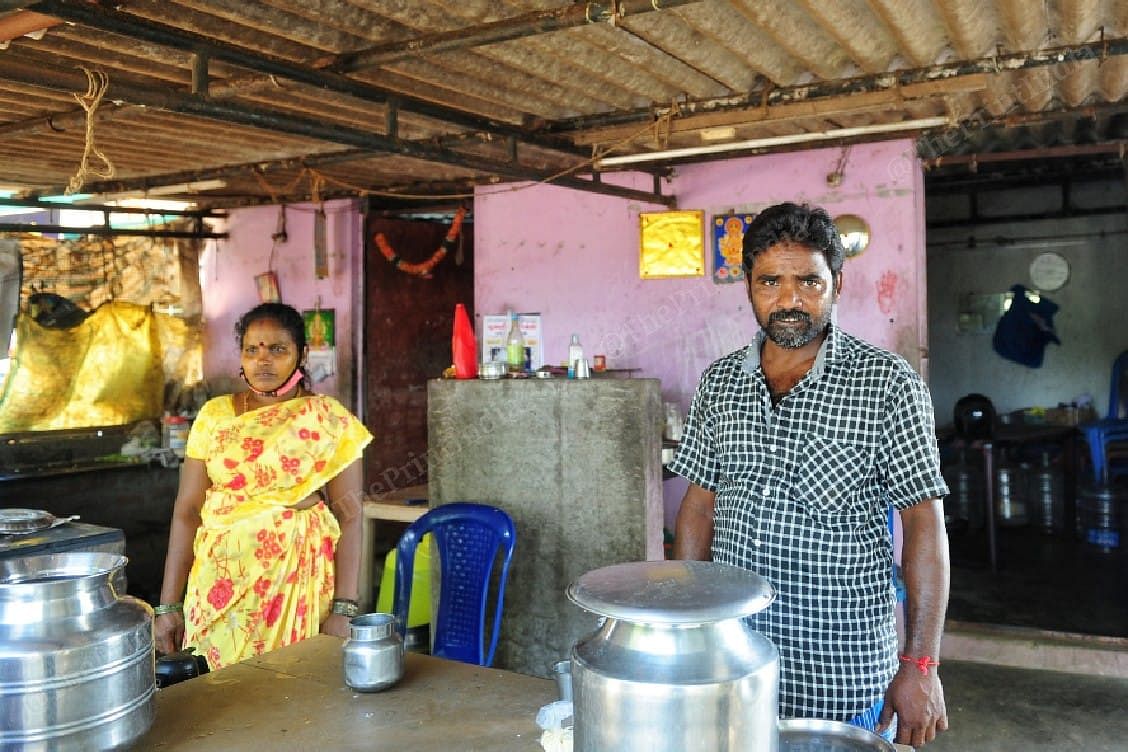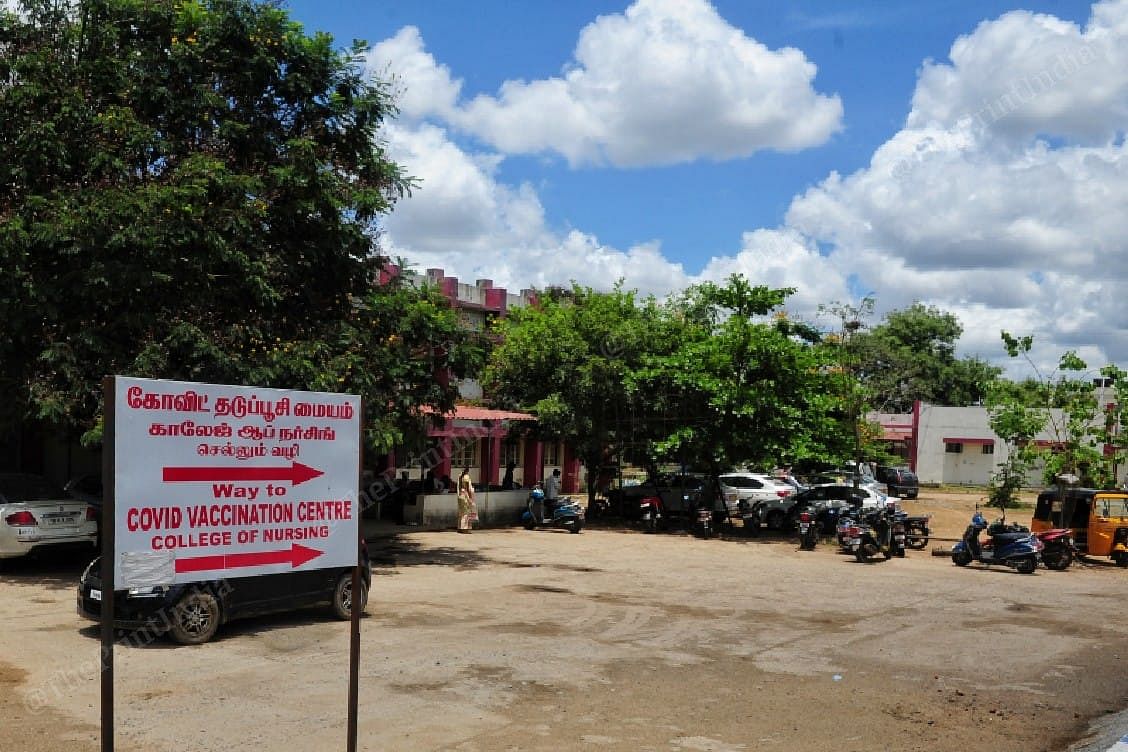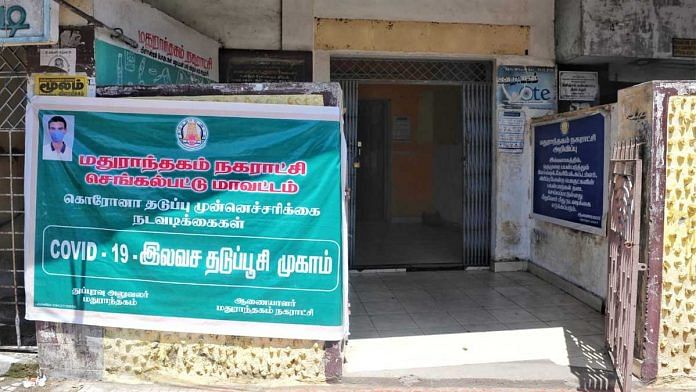Chennai: K.R. Gopalan, a 24-year-old PhD scholar from Tamil Nadu capital Chennai, is adamant. He won’t get the Covid-19 vaccine. “I don’t want to take the injection. I don’t know the side effects or how it will impact my body a few years from now. So, if I am not 100 per cent sure, I will not take it,” he told ThePrint.
Gopalan is not the only one. Despite high education levels and a fairly robust health infrastructure, vaccine hesitancy is said to be rampant in Tamil Nadu.
The vaccination drive in the state continues to be slow and trails the national average. According to health ministry data, as of Sunday, Tamil Nadu had administered 48,14,633 first doses of the vaccine, which is 6.31 per cent of the total population, and 16,08,046 second doses, which makes up only 2.11 per cent of its population.
This is concerning as Tamil Nadu has seen a surge in cases in the past few days. Tamil Nadu recorded 27,000 cases Saturday and is among the 12 states in the country with over 1 lakh active cases.
One of the reasons cited for the prevalent suspicions about the Covid vaccine is the death of Tamil actor Vivekh last month. The popular comic actor died on 17 April after suffering a massive cardiac arrest. He had got the vaccine just a day before.
A strong proponent of the Covid vaccines, Vivekh got his dose with the state’s Health Secretary J. Radhakrishnan and other government officials. He collapsed the next day and was admitted to hospital where he passed away.
After his death, the fear of vaccines was palpable across the state. This even prompted Radhakrishnan to address a press meet where he explained that Vivekh’s cardiac arrest had no connection to the Covid vaccine. And yet, the hesitancy continues.
Dr A.D. Boscoraja, from the public health department in Thoothukudi district’s Kovilpatti, Vivekh’s hometown, noted that it was difficult to convince people about getting vaccinated.
“Many people don’t convey the exact fear they have in mind, which makes it difficult for us to convince them. But since it’s voluntary, we are not forcing people. Soon they will realise its safety,” said Dr Boscoraja.
Tamil Nadu has had a long history of vaccine hesitancy. According to the National Family Health Survey-4 (2014-16), the coverage of basic vaccines in the state was 69 per cent despite some of the best health indicators.
A 2019 Chennai-based study, published in the Indian Journal of Community Medicine, said: “The main drivers for vaccine hesitancy (in Tamil Nadu) were scepticism against newer vaccines, concerns about safety and fear of adverse effects and the feeling that vaccines against uncommon diseases are not necessary.”
Also read: 13 deaths: Chengalpattu hospital dean claims O2 pressure dropped, but shortage wasn’t cause
Vaccine hesitancy and misinformation in rural Tamil Nadu
The problem of vaccine hesitancy is even starker in the rural areas of Tamil Nadu, and most of it appears to stem from rumours and misinformation.
Yelu Malai, a 36-year-old resident of the village Chitravadi in the Kancheepuram district, has not gotten vaccinated yet, nor is he planning to. “Our entire village has not taken the vaccine because we were told that it has caused deaths in some people,” he said.
Others fear that the side effects will not allow them to work. Usha and her brother, who are both farmers in Chitravadi, said they didn’t want to get the vaccine because it’s peak farming season and they believe the shot will mean a fever for 10-15 days.
“People are coming to our village asking for us to be vaccinated but we can’t. If we vaccinate right now, we will get fever for 10-15 days, which is not good for our farm. In order to keep our immunity strong, we are eating citrus fruits and drinking concoctions of kabasura kudineer and nilavembu kashayam (Siddha drugs).”
While the Covid vaccines in circulation are known to cause side effects such as fever and body ache, most of these dissipate within one or two days. Both the vaccines cleared for use in India are described as safe even as researchers keep an eye out for potential adverse effects. But with little information being disseminated in rural areas, most are unaware of this.
At a government hospital in Chengalpattu, located on the outskirts of Chennai, some healthcare workers were also initially afraid to get the vaccines but now the situation has improved.
“In the months of January and February, even healthcare workers were hesitant. More than efficacy, people were worried about side effects. From 1 March, when we opened up vaccination for the general public, did people start turning up. On average, we had about 300 people turning up for vaccination,” said Dr Parameshwari, nodal officer for vaccinations.

Also read: Up to 530% spike in poll states, 152% after Holi — the big culprits in India’s new Covid wave
Tamil Nadu faces shortage of vaccines
Besides hesitancy, Tamil Nadu is also facing a critical shortage of vaccines.
According to G. Prakash, former commissioner of the Greater Chennai Corporation (GCC), the capital city was recording approximately 6,000 cases every day but only 22 per cent of the population had been inoculated so far.
“My aim was 25 lakh vaccinated by end of April and 40 lakh people by end of May. However, supply is a constraint,” he said.
The central government has given just over 70 lakh doses to Tamil Nadu, according to GCC officials, while the population of Chennai alone is 75-80 lakh people.
This shortage is cited as the reason why vaccination for the 18-45 age group hasn’t even started in the rural areas.
At the Chengalpattu Government Hospital, only those above 45 years are being inoculated.
“Due to limited supply of vaccines, we are only vaccinating people above the age of 45 years. As of now, we have only received orders to vaccinate this set of people.” said Dr Parameshwari.

Doctors try to curb vaccine wastage
Since vaccinations began in the country, Tamil Nadu has topped the list of states with the highest amount of vaccine wastage at 8.8 per cent.
In Madhuranthakam, a district within the Chengalpattu area, one of the four vaccination centres was vacant at 1 pm Sunday.
The health worker present there, who did not wish to be named, said, “So far we have had six people turn up. This means one vial has been opened, if no one turns up today, this will be wasted.” A single vial of vaccine can inoculate 10 people.
Meanwhile, at a government hospital in the same district, a senior doctor turned a 50-year-old away when he came to get the vaccine. “We have vaccinated 10 people today. If we open a fresh vial for him it might get wasted if more people don’t turn up. It is better if he comes tomorrow morning when other residents turn up,” she said.
According to Dr K. Kolandaswamy, former head of the Directorate of Public Health in Tamil Nadu, vaccine wastage was high because of the open-vial policy.
“During the vaccination programme against measles, rabies etc, health workers were trained to vaccinate even if one person turned up. Now, this became a problem since the Covid-19 vaccine is precious and needs to be used within 4 hours of being opened. Our workers have evolved with the need of the hour and are now using the vaccine judiciously,” said Dr Kolandasamy.
Presenting a better vaccination outlook for the furture, Kolandaswamy added that “vaccine hesitancy in the state has declined after the second wave hit the country”. “Public opinion has now changed, getting mild fever or some muscular pain is more bearable than having Covid,” he said.
(Edited by Rachel John)
Also read: Still playing the book-vaccine-slot game on CoWin? That’s because there’s a shortage of doses



